
Russia is not an easy place for a Jew to live. So when a leading Russian news show asked a leading Russian synagogue for permission to film its High Holiday services, community leaders were eager to jump on the opportunity. With anti-Semitism on the rise throughout Eastern Europe, they felt this would be a perfect opportunity to improve the image of Jews in the former Soviet Union. However, is granting permission to film tefillah on such holy days in keeping with the letter and spirit of the Torah?
The rabbi of the synagogue posed this to a most respected authority, Rav Asher Weiss. Rav Weiss is unparalleled in terms of his universal approbation. A perusal of his collection of responsa, Teshuvot Minchat Asher, reflects the wide variety of rabbis who pose questions to him. From great Sephardic rabbis (such as Rav Ovadia Yosef Toledano, grandson of Hacham Ovadia) to heads of Satmar yeshivot, to heads of Hesder yeshivot (which combine service in Tzahal and Torah study) to Yeshiva University rabbanim such as Rav Hershel Schachter, Rav Asher Weiss has emerged as an address to capably resolve the most challenging halachic questions of the day.
Rav Weiss has an extraordinary grasp of Torah, but also a very solid understanding of chol—non-sacred matters such as business and science. He is practical and sensitive to human needs. He has the knack to know when it is appropriate to be lenient and when a more strict approach is necessary. He is the perfect rav to address the dilemma faced by the Russian congregation.
Rav Weiss begins his responsum noting that he understands and appreciates the potential positive result of the filming of the tefillah. He also states that there would be no technical violation of Shabbat or Yom Tov on the part of the worshipers since they are not participating even indirectly in the filming of the tefillah.
Rav Weiss, though, notes that the filming would create a considerable disruption to the tefillah. Rav Weiss emotionally notes how a beit knesset is a refuge from where we pour out our hearts to Hashem and He arrives to listen! The sanctity and serenity of this precious space must not be disturbed.
Rav Weiss also notes a policy concern. He notes that many Jews who did not have an opportunity to study in yeshiva join High Holiday services. The Minchat Asher worries that these Jews would conclude from the presence of a film crew in the sanctuary during the holiday that it is permissible for them to watch television on Shabbat and Yamim Tovim. In fact, he relates how a synagogue in South America permitted filming High Holiday services and, as a result, a large segment of the community accused the rabbis of hypocrisy! They charged that the rabbis proclaim that we cannot watch television on sacred days and yet when it suits them they permit a television crew to film tefillah at the beit haknesset on the holiest days of the year.
Rav Weiss thus concludes that the potential good that could be reaped by the filming of the services is far outweighed by the negative impact of granting such permission.
Hashem sends great rabbinic leaders to each generation. Hacham Yitzhak Yosef and Hacham David Yosef are perfectly suited for our generation, as are so many other leading rabbinic figures such as the Minchat Asher. Lo alman Yisrael. We are far from bereft of great halachic authorities. Rav Asher Weiss in this responsum gives us a taste of the fact that able hands are at the wheel, very competently leading our people.
By Rabbi Haim Jachter
Rabbi Haim Jachter is the spiritual leader of Congregation Shaarei Orah, the Sephardic Congregation of Teaneck. He also serves as a rebbe at Torah Academy of Bergen County and a dayan on the Beth Din of Elizabeth.










